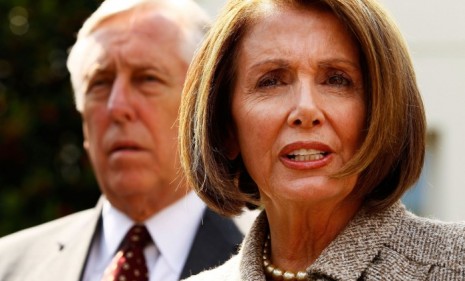How Washington gridlock could save America
If Republicans take over the House, the nation's political business would likely grind to a halt. Might that help solve our budget woes?

A free daily email with the biggest news stories of the day – and the best features from TheWeek.com
You are now subscribed
Your newsletter sign-up was successful
At the start of Congress' four-week fall session, the legislative pace is "somewhere between sluggish and stalled," says Politico. But it could seem speedy by comparison if, as expected, Republicans take control of one or both houses of Congress in January and enter a showdown with the Obama adminstration. "We're probably headed for a period of intense gridlock," says University of Virginia political science professor Larry Sabato, "and that's just going to be a fact of life." Will gridlock keep Washington from solving the country's problems, or could it actually help by keeping Congress from spending money it doesn't have? (Watch The Week's Sunday Talk Show Briefing about the midterm elections)
Gridlock is the only way to rein in spending: For fiscal conservatives, the coming "divided government" could be a godsend, says Stephen Slivinski in the Washington Examiner. Historically, per capita federal spending has grown by 3.1 percent in years when Congress and the White House were in the hands of the same party, and by only 1.9 percent when Republicans and Democrats had to share power. So if you want spending discipline in Washington, cross your fingers and hope for "institutional gridlock."
"Want spending discipline? Wish for gridlock"
The Week
Escape your echo chamber. Get the facts behind the news, plus analysis from multiple perspectives.

Sign up for The Week's Free Newsletters
From our morning news briefing to a weekly Good News Newsletter, get the best of The Week delivered directly to your inbox.
From our morning news briefing to a weekly Good News Newsletter, get the best of The Week delivered directly to your inbox.
This is a terrible time to paralyze the government: America doesn't need gridlock — it needs leadership, says Joe Weisenthal at The Business Insider. President Obama "is offering a vision about how to move the country forward," while Republicans are bragging that they're going to impose the same useless "stalemate" we had last time they were in charge. "The president, like most Americans, is open to hearing new ideas to create jobs and boost the recovery from anybody in any party" — it's a shame Republicans can't come up with any.
"The White House: If the GOP wins, they will shut down the government like Newt did"
Republicans don't really have a choice: Republicans in Congress couldn't "compromise on taxes and spending" even if they wanted to, says Eric Pianin in The Fiscal Times. Any GOP politician who plays ball with Democrats is virtually assured of facing the wrath of the Tea Party in the next primary. And there will be "narrow majorities" in both houses of Congress, no matter who's in control, which is "a recipe for absolute budget stalemate, with one or more government shutdowns a real possibility."
"The primaries: A wake-up call — or more gridlock?"
A free daily email with the biggest news stories of the day – and the best features from TheWeek.com